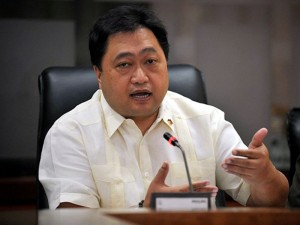In ’14, gov’t to push through sale of bonds abroad
MANILA, Philippines—The government in 2014 will push through with the sale of sovereign bonds abroad.
Finance Secretary Cesar Purisima said that, although significant amounts of cheap official development assistance (ODA) are being offered to the country in the aftermath of Supertyphoon Yolanda, it would be prudent for the country to also raise funds from commercial sources.
He also stressed how important it was for the Philippines to maintain its “presence in the international market,” and how it must not forego foreign borrowings for an extended period.
In an effort to temper the sharp appreciation of the peso in 2012, the government this year decided not to sell bonds abroad. Officials said the move had helped reduce dollar inflows and eased the peso’s rise.
After ending 2012 in the 41-to-a-dollar territory, the peso now hovers in the 43-to-a-dollar level.
Article continues after this advertisementThe Department of Finance and its attached agency, the Bureau of Treasury, have yet to finalize details of the government’s borrowing plan for 2014.
Article continues after this advertisementBut preliminary reports showed that the government is looking to borrow $2.2 billion from foreign sources next year. The amount accounts for 13 percent of the country’s total borrowing requirement. The rest, or about 87 percent, would be sourced from the domestic capital market.
Of the proposed $2.2 billion to be secured from the offshore market, about $1 billion will be raised through the sale of bonds. ODAs will make up the rest.
At the moment, the Treasury is laying the groundwork for a possible bond sale early next year, National Treasurer Rosalia de Leon yesterday said during an event of the Financial Executives Institute of the Philippines (Finex).
She told reporters that details of the bond sale are now being discussed by finance officials.
According to Purisima and De Leon, the borrowing figures will be settled once the government released its reconstruction master plan for areas devastated by Supertyphoon “Yolanda.”
They said the government’s borrowing requirement for 2014 would be determined partly by the cost of the reconstruction as stated in the master plan.
The government targets to complete the plan in less than two weeks.
In the aftermath of “Yolanda,” several foreign institutions have pledged support for the Philippines.
The World Bank and the Asian Development Bank each offered $500 million worth of financing. Government officials expect other foreign development lenders to also offer low-cost ODAs.
The overwhelming expression of support from foreign institutions elicited the proposal for the government to secure all its foreign borrowing requirements for 2014 from ODAs.
Long-term ODAs have maturities of as long as 30 years, and have interest rates of less than 1 percent.
But Purisima said that the country could not fully rely on ODAs because the funds are normally disbursed in tranches over the long term. Commercial loans, on the other hand, may be immediately tapped and may allow the borrower to decide the timing of the disbursement.
